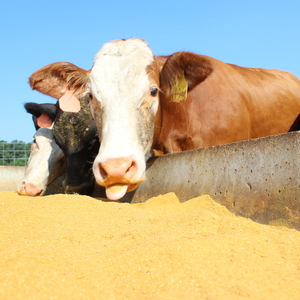Study digs more deeply into DDGS supplemental feed value

W. Brandon Smith
June 16, 2017
BY Lisa Gibson
Researchers at Texas A&M University have found that DDGS increases the rate at which cattle digest bermudagrass, but decreases the overall digestibility of the forage. The study was built on existing knowledge of the effects of other supplemental feedstocks for grazing cattle, but delved further into the topic to evaluate the effects the feed could have on the kinetics within the digestive system, said W. Brandon Smith, a doctoral candidate who led the research. “In October, when digestibility of the bermudagrass forage was least, the addition of supplemental DDGS mitigated the loss in digestibility caused by late-season harvest,” he said.
Tifton 85 bermudagrass is a common forage grass across the south and southeast U.S. But as the plants mature, they become harder for livestock to digest. Smith’s research, conducted under the tutelage of Monte Rouquette, a professor with Texas A&M AgriLife Research, helps determine the most effective and efficient ways to use DDGS as a supplement.
Advertisement
“There is a wealth of research regarding the use of DDGS for dormant forages, rangeland and cool-season grasses,” Smith said. “This study in particular was designed to fill a niche of actively growing, warm-season grasses that seems to have been overlooked in the realm of DDGS supplementation. In nearly all cases, DDGS have been shown to improve the production of grazing animals.” Regardless of the type of forage base used by a rancher, a time in the season will come when an important nutrient is missing, Smith said. In warm-season grasses, it’s generally protein; in cool-season grasses, it’s energy.
The research showed DDGS supplementation at 0.25 percent body weight increases gains with stocker cattle grazing Tifton 85 bermudagrass through the summer months, Smith explained. “The knowledge that supplementation decreases overall digestibility in the early season leads us to believe that such a system may offer the opportunity for a two-part management scheme in which younger, lighter-weight animals may be allowed to graze early season pasture without supplementation, while heavier, older animals may be supplemented with DDGS in the later season for optimized performance.”
Companion papers related to the research are underway and will highlight vitro kinetics, methane production and animal performance measures from the supplementation system outlined in Smith’s work. He expects the papers to be published within the next 18 months.
Advertisement
“For any rancher, livelihood is the bottom dollar. And while digestibility is an important component of animal performance, it is a component that allows us, as scientists, to understand how better to manage the animals for optimized production,” Smith said.
Upcoming Events





